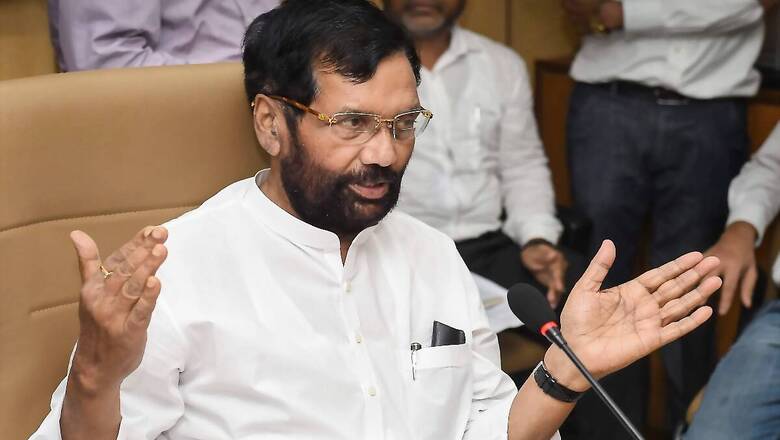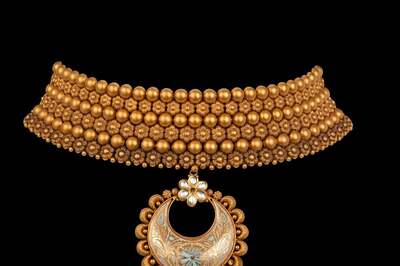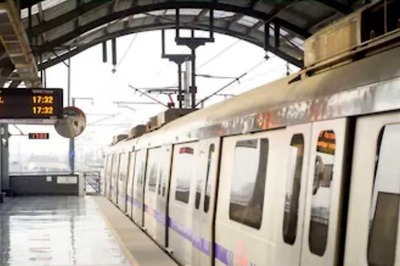
views
Lok Janshakti Party founder Ram Vilas Paswan was one of the greatest sons of Bihar, a giant among the top few politicians of the country and a colossus among Scheduled Caste leaders who overrode the politics of Bihar and the country for more than 50 years.
Paswan epitomised the long-drawn struggle he waged to cast off segregation and political and economic discrimination against the Scheduled Castes and Scheduled Tribes. He was the spearhead of the Dalit movement and insisted that caste discrimination would usher in chaos in the society and deter the progress of the country.
Paswan has left the world with indelible memories of his astonishing poise and his persona as an unassailable symbol of decency and grace. He was uneasy with the idea of being projected as a Dalit icon but he did not escape criticism as a politician promoting his family members and as an individual for his ostentatious lifestyle and domineering streak.
Paswan, the senior most member of Bihar’s political triumvirate comprising Lalu Prasad and Nitish Kumar, had transformed Bihar’s political narrative from centrist to subaltern politics and contributed positively in the establishment of the rule of the hitherto deprived sections of the society.
Of the trio, Ram Vilas Paswan has enjoyed power at the Centre as senior-most member of the Union cabinet for nearly three decades but he never got a chance to become the Chief Minister of Bihar – a dream he nourished ever since he joined politics in the late sixties.
As a Dalit leader, Paswan was a powerful force and deeply influenced the electoral politics of Bihar. He not only championed the cause of Dalit community but also took their political aspirations to the national level. He had a strong clout among Bihar’s Scheduled Castes, particularly the Dusadh community.
He projected himself as the most suitable candidate for a Dalit Prime Minister. ‘Goonje Dharti Aasman, Ram Vilas Paswan’ used to be a popular slogan his supporters raised at every public meeting, appealing to people to vote for the LJP so that Paswan could become the next Prime Minister.
Known for his political astuteness, Paswan had been a key player in the government formation at the Centre. He was so adept in making political negotiations that he had been part of the Union cabinet in different coalition governments at the Centre – the National Front, the United Front of the non-Congress and non-BJP parties, the BJP-led National Democratic Alliance (NDA), and the Congress-led United Progressive Alliance (UPA).
Ram Vilas Paswan was referred to as ‘Mausam Vigyani’ (weatherman) of Indian politics due to his flip-flops from one alliance to the other and his reported abilities to sense the mood of the electorate.
He was also considered once for the post of the Prime Minister when the Congress brought down the Deve Gowda government in 1997. However, the choice finally fell on IK Gujral, who was then the external affairs minister.
Born on July 5, 1946 in the Dalit family of Jamun Paswan and Siya Devi at Shaharbanni in Khagaria district of Bihar, Paswan held Bachelor of Law and Masters in Arts degrees from Kosi College Khagaria and Patna University. He was selected as a Deputy Superintendent of Police before he joined active politics and became an MLA from Samyukta Socialist Party (SSP) in 1969.
In 1970, he was made joint secretary Bihar branch of the SSP and four years later, he became the general secretary of the Lok Dal, which was formed after merger of the SSP and other like-minded parties. He was attracted to the Maoist philosophy and was once imprisoned for his ‘activities’ in 1970.
In 1974, he became a follower of Jayprakash Narayan and in 1975 he was arrested and jailed during Emergency. He was released in 1977 and ran for Lok Sabha polls as Janata Party candidate from Hajipur winning with a record margin.
For over 40 years since 1977, he continuously won from Hajipur Lok Sabha seat and once from Rosera Lok Sabha seat in 1991. He lost only twice from Hajipur constituency in the 1984 and 2009 Lok Sabha elections. In 1983, he floated Dalit Sena, an organisation for the emancipation and welfare of the Scheduled Castes.
He founded Dalit Sena when he was considered a firebrand leader of the socially weakest sections of the society and Kanshi Ram had not come up with Bahujan Samaj Party yet. The establishment of Dalit Panthers in Maharashtra in 1972 might have inspired him to float the Dalit Sena.
With the support of the Dusadh community and other Scheduled Caste members, Paswan had tilted the balance in favour of the political combination of which he was a part. As part of the NDA during the 1999 Lok Sabha elections, he ensured more than 40 Lok Sabha seats out of 54 to the NDA in the united Bihar, which was then under the Lalu-Rabri regime. It paved the way for the installation of AB Vajpayee as the Prime Minister.
He launched the Lok Janshakti Party (LJP) in 2000 after breaking away from the Janata Dal. The LJP’s first foray into electoral politics was in the 2004 Lok Sabha polls in alliance with the Rashtriya Janata Dal (RJD) led by Lalu Prasad and Congress as part of the UPA. The RJD-led alliance won 33 out of 40 Lok Sabha seats in the divided Bihar, leaving the NDA high and dry.
But in the two successive assembly polls held in February and November 2005, Paswan fought alone. In February, it was a hung assembly and the LJP had the key to government formation with 29 assembly seats. But Paswan chose not to support either the BJP-led NDA or the RJD-Congress combine, leading to imposition of President’s Rule in the state.
In the November 2005 polls, Paswan’s LJP was confined to 10 seats in the 243-member Bihar Assembly. However, it ensured RJD’s defeat in at least 40 seats, paving the way for Nitish Kumar to form the NDA government.
For the 2009 parliamentary polls, he had forged an alliance with the RJD and the Samajwadi Party led by Mulayam Singh Yadav. Paswan lost the polls to former Bihar chief minister and Janata Dal nominee Ram Sundar Das. The LJP could not win even single seat while the RJD was reduced to four seats. Following his defeat in 2009, he was elected to the Rajya Sabha.
It was a disastrous move as the LJP could not win even a single seat while the RJD won four seats. The LJP had also suffered a major jolt when its entire Jharkhand unit merged with the Congress before 2009, forcing Paswan to announce dissolution of the party’s Jharkhand unit.
In the 2010 Bihar assembly election, Paswan had contested in alliance with the RJD against the resurgent NDA comprising the BJP and JD(U). However, the LJP could win only three seats securing 6.75% votes against the November 2005 poll tally of 10 seats. Eventually, two of the three MLAs of the LJP merged with the ruling JD(U).
Before the 2014 Lok Sabha elections, Paswan waited for nearly two months for the Congress to seal a pre-poll alliance. But two months of negotiations reached nowhere. Instead, the CBI trailed him in the recruitment scam in Bokaro Steel Plant.
In a swift move, a self-proclaimed champion of secularism, Paswan suddenly found nothing wrong with BJP prime ministerial pick Narendra Modi, over whom he had quit the union cabinet in 2002. Paswan asserted that the courts had found nothing against Modi in the post-Godhra riots.
He was elected from Hajipur in 2014 while his son Chirag Paswan won from Jamui seat. In the 2019 general elections, he left the Hajipur seat for his younger brother Pashupati Kumar Paras and became the Rajya Sabha MP.
In the 2015 assembly election, Paswan-led LJP contested 40 out of 243 assembly seats as part of the NDA but it could win only two seats. The JD(U) had forged an alliance with the RJD as part of the Mahagathbandhan, which had swept the polls.
Paswan had been accused of making the LJP a ‘Brother-Son Party’ with control of his younger brothers and now his actor-turned-politician son Chirag Paswan whom he installed as chairman of the LJP’s parliamentary board and later as party president.
The biggest drawback of Paswan had been his failure to build a strong social base among other castes and instead promoting criminals-turned-politicians facing charges of murder, kidnapping, extortion and loot.
In a bid to fulfill his ambition of becoming the lone Dalit leader for PM contention, Paswan had set his eyes on Uttar Pradesh. The LJP had divided Uttar Pradesh into four zones and placed them under senior leaders.
His supporters recall how he saved lives of several Sikhs during 1984 riots following assassination of the then PM Indira Gandhi. His wife Reena Paswan was the driving force behind his courageous act. He is also known as the ‘adopted brother’ of the late ‘Bandit Queen’ Phoolan Devi.
Paswan held key ministries in the Union Council of Ministers including in the VP Singh government – railway minister, communications and information technology, chemicals and fertilizers, mines and coal, steel and consumer affairs, food and public distribution.
His passing away has created a void in the political echelons of the country that cannot be filled in the near future.
Read all the Latest News and Breaking News here




















Comments
0 comment